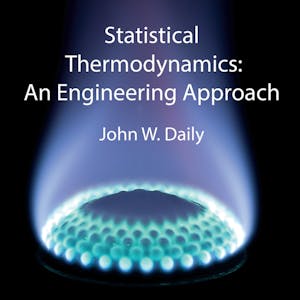Statistical Thermodynamics
About this Specialization
This specialization was developed for the mechanical or aerospace engineering advanced undergraduate graduate or graduate student who already has a strong background in undergraduate engineering thermodynamics and is ready to tackle the underlying fundamentals of the subject. It is designed for those entering advanced fields such as combustion, high temperature gas dynamics, environmental sciences, or materials processing, or wishes to build a background for understanding advanced experimental diagnostic techniques in these or similar fields. It covers the relationship between macroscopic and microscopic thermodynamics and derives properties for gases, liquids and solids. It also covers non-equilibrium behavior as found in kinetic theory and chemical kinetics. The main innovation is the use of the postulatory approach to introducing fundamental concepts and the very clear connection between macroscopic and microscopic thermodynamics. By introducing basic ideas using postulates, students are given a very straightforward way to think about important concepts, including entropy and temperature, ensembles and quantum mechanics.Created by: University of Colorado Boulder

Related Online Courses
In this Specialization, you will learn industry-standard theory and methods for developing successful user interfaces (UIs). Upon completing this Specialization, you will have fluency with the user... more
The Control Flow in RPA course provides a deep understanding of the automation flow. Control Flow is a concept that refers to the order in which actions are executed and \"control\" flows in an... more
This third course in the XR for Everybody specialization is geared toward the technical development of XR experiences. The course provides learners with a more technical mental model of XR... more
In this course, you learn practical skills to explore and visualize data. You will follow a small business owner\'s data-driven journey to improve company performance to gain skills to prepare... more
The course provides the principles of modelling and simulation of modern mechatronic systems, which are mechanical systems integrated with several types of sensors and actuators. The aim of the... more







